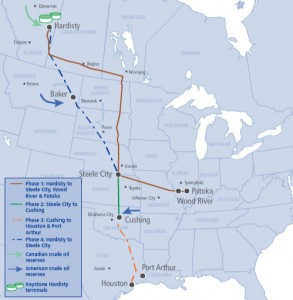Keystone XL Tar Sands Pipeline: Splitting the Project Means Double the Trouble
 Bullying American landowners and stockpiling pipe for a rejected project show the arrogance of the Canadian pipeline company TransCanada as it tries to reanimate the Keystone XL tar sands pipeline.
Bullying American landowners and stockpiling pipe for a rejected project show the arrogance of the Canadian pipeline company TransCanada as it tries to reanimate the Keystone XL tar sands pipeline.The latest news is that TransCanada is proposing to split the Keystone XL tar sands pipeline in two in order to get around the U.S. process to review international pipelines for their national interest. TransCanada says that it will seek the presidential permit for the border crossing, but move ahead separately with the southern portion of the rejected Keystone XL tar sands pipeline from Oklahoma to the Gulf. This is a ploy to avoid a review that will show how the Keystone XL tar sands pipeline will raise U.S. oil prices, send tar sands overseas, endanger U.S. homes and waters, and contribute to worsening climate change.
What part of “no” does TransCanada not understand? Texans, Nebraskans, and folks all across the country are saying that whether in a hundred pieces or one piece, the Keystone XL tar sands pipeline is not in the national interest. At a time of public worry about rising gas prices, lawmakers should be concerned about a project that will in diverting oil from the Midwest gasoline refining operations to Gulf Coast diesel refining operations thereby raising U.S. oil and gas prices.
So what exactly has TransCanada proposed? TransCanada announced that it has let the State Department know that the company will submit a new application for a presidential permit for the northern portion of the Keystone XL tar sands pipeline from the border crossing in Montana to Steel City, Nebraska on the Kansas border where an already existing part of the pipeline starts.
TransCanada would supplement this application with the proposed route through Nebraska after that has been determined in cooperation with Nebraska. But there is some question as to how long this would take since Nebraska does not currently have laws in place to do this assessment. TransCanada will then apply separately to the various federal and state permits for the southern portion of the pipeline from Cushing Oklahoma to the Gulf Coast.
Raw tar sands oil going from the Midwest to the Gulf for refining means serious pipeline safety issues for landowners and environmental justice impacts of tar sands refining. Concerns of Texas landowners over TransCanada’s high-handed attempts to take their land through eminent domain will all remain the same in the case of an Oklahoma to Texas tar sands pipeline.
And the southern route pipeline will still provide the main service to oil companies that Keystone XL would provide: it will divert tar sands from the Midwest to the Gulf, raising American oil prices and likely also gasoline prices. An Oklahoma to Texas tar sands pipeline will mean more tar sands converted to diesel and available for export overseas. It will mean less tar sands remaining in the US, even while Americans bear the risks of the pipeline.
TransCanada is clearly trying to circumvent the process that we have in place for approving international pipelines by now going around the presidential permit national interest determination requirement for the part of this pipeline that will hurt the U.S. economy. Whether in pieces or as a whole, the Keystone XL tar sands pipeline is not in the national interest.
Here is a video clip of a recent protest of Texas landowners in reaction to TransCanada’s bullying and the threats that the tar sands pipeline would pose to homes and waters.
You can return to the main Market News page, or press the Back button on your browser.

